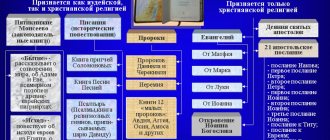Is every person a lie?
Poetry lovers are familiar with the lines from Fyodor Tyutchev’s poem “Silentium!” ("Silence!"):
How can the heart express itself? How can someone else understand you? Will he understand what you live for? A spoken thought is a lie.
Wonderful poems by the poet-philosopher about the birth of thought in the depths of the heart and the difficulties of translating it into words, the difficulties of other people understanding it.
According to St. Gregory of Nyssa, such a phrase can mean this:
“Whoever strives to explain the unspeakable with words is truly a liar, not out of hatred of the truth, but out of impotence of speech.”
Most likely, the poet means these pangs of creativity. But the question arises: if in the depths of the heart a thought is pure and true, but after saying it becomes false due to the powerlessness of speech, is the author not too categorical? After all, so many true books have been written about the Truth and Truth of God.
We are not talking about deliberately distorting what is in a person's heart. Fyodor Tyutchev served in the Collegium of Foreign Affairs and knew very well the saying, widely known in diplomatic circles: “Language is given to man in order to hide his thoughts.”
But this is very similar to other words - from the psalms of King David. According to the psalmist, not only thoughts and words, but the whole person is a lie. And not just any specific sinner, but everyone living on earth (see: Ps. 115: 2).
This 115th Psalm is included in the Canon for Communion, and therefore many Orthodox Christians are familiar with it.
These words are often uttered in church circles: “Every man is a lie.” But they begin like this: “ I said in my frenzy : every man is a lie.”
Enchantment (in Greek - ecstasy, from the ancient Greek ἔκστᾰσις) - being outside oneself, being outside, admiration, the highest form of prayerful standing. Ecstasy is a special spiritual state, which holy ascetics call “smart contemplation”, “spiritual vision”, “vision ” , “amazement”, “higher vision”. Enrage is found in the Bible when it speaks of the visitation of a person by the Holy Spirit.
“In such “spiritual admiration” the ascetic ascends angelically to the contemplation of the Holy Trinity and the mysteries of the economy of our salvation. He acquires the ability to contemplate the true essence of things, inaccessible to natural reason; the primitive (forefather Adam) enlightenment and the ability to see the blessed light are returned to him” (Reverend Gregory of Sinaite).
This is how it happened with Saint Moses, with Saint David, with the Holy Apostle Peter and the Holy Apostle Paul, when he found himself in the third heaven and heard unspeakable words.
According to the interpretation of Saints Athanasius and Basil the Great, David here refers to frenzy as defeat and surprise, when, having reached the Heavenly abodes in his spirit and seeing the wonderful land of the living with the assistance of the Holy Spirit, he clearly said that every person in this world is lying about human bliss, which Gregory the Theologian called false prosperity.
“Having become higher than man, I despised everything human. For frenzy means change. Having said: “I will please... the Lord” (Ps. 115:8), then seeing that “every man is a lie” (because human thoughts are deceptive), I humbled myself and subjected myself to suffering, so as not to fall from the height of my standing” (St. Athanasius Great).
David, through the Holy Spirit, contemplated fallen human nature - and saw its falsity
If we summarize the thoughts of the holy fathers, then David, through the Holy Spirit, contemplated the fallen human nature of the descendants of Adam - the old man. And I saw that human thoughts, words spoken, actions, heart, mind, reason, reason are all lies.
Well, what about King David himself? We read about this from Basil the Great:
“The Prophet here does not contradict himself, as some sophists try to expose him for, claiming that if every man is a liar, and David is also a man, then, obviously, he himself was a liar. And if he is deceitful, then he does not need to believe what he claims. And the truth is as we say. For people are called (here) those who still possess human passions, but the one who has already become above carnal passions and, through the perfection of his mind, has passed into the angelic state, when he speaks about human affairs, he obviously excludes himself from the ranks of other people.”
It is clear that if there is an exception for the prophet David, then we will try to take advantage of this and find out the conditions for such an exception.
According to St. Gregory Palamas, frenzy in the broad sense “is a withdrawal from worldly and carnal wisdom...” In other words, frenzy is
“unceasing mental prayer, in which the human mind has a constant memory of God, freed from all attachments to passions and the so-called world of sin” (Metropolitan Hierotheus Vlahos).
But in order to come out of yourself, you must first know yourself, to know what you need to come out of. And according to the holy fathers, “man is the one who knows himself” (Reverend Pimen the Great).
Neil of Sinai: “When you know yourself, then you will be able to know God”
“He who knows himself is given the knowledge of everything; and everything obeys the one who obeys God, when humility reigns in his members” (Holy Martyr Peter of Damascus).
“Whoever is able to know the dignity of his soul can know the power and secrets of the Divine” (Reverend Macarius of Egypt).
“Just as he who knows himself knows everything, so he who does not know himself cannot know anything else” (St. John Chrysostom).
“When you know yourself, then you will be able to know God, and, as you should, view the creatures with your thoughts” (Reverend Neil of Sinai).
“It is necessary for those who wish to become a partaker of the Heavenly Light to know themselves” (Reverend Nicodemus the Holy Mountain).
“Whoever has known the weakness of human nature has received an experienced knowledge of God’s helping power” (Reverend Maximus the Confessor).
He who knew himself saw that there was in him “the hidden man of the heart” (1 Pet. 3:4), in Scripture called “a child of God” (John 1:12), “son of light” (Luke 16:8), “ born again" (John 3:3), "lived from the dead", "heavenly" (1 Cor. 15:47, 49), "inner man" (2 Cor. 4:16), "spiritual" (Eph. 4:21), “a new creation” (2 Cor. 5:17).
But where does self-knowledge begin? According to Bishop Innokenty of Kherson, “he is good who sincerely considers himself bad, he is just beginning to be good.” This is the beginning, this is the first step. At its peak may be the thoughts of St. Silouan of Athos:
“We can reason only to the extent that we have known the grace of the Holy Spirit”; “The perfect ones say nothing of themselves. They say only what the Spirit gives them.”
Or, according to the Apostle Paul, Divine power operates in a regenerated person, “which produces both will and action” (Phil. 2:13). That is, a true thought, a word, and an action.
In this regard, we can give an example from the life of St. Silouan of Athos from the book “Elder Silouan” by Archimandrite Sophrony (Sakharov):
“In 1932, the monastery was visited by a Catholic doctor, Father Chr. B. He talked a lot with O.V. on various issues of the life of the Holy Mountain and among other things asked:
– What books do your monks read?
– John Climacus, Abba Dorotheus, Theodore the Studite, Cassian the Roman, Ephraim the Syrian, Barsanuphius and John, Macarius the Great, Isaac the Syrian, Simeon the New Theologian, Nikita Stiphatus, Gregory Sinaite, Gregory Palamas, Maximus the Confessor, Hesychius, Diadochus, Nile and other fathers , available in the “Philokalia,” answered O.V.
- Your monks read these books. “Only professors read them here,” said the doctor, not hiding his surprise.
“These are the reference books of each of our monks,” answered O.V. “They also read other works of the holy fathers of the Church and the works of later ascetic writers, such as Bishop Ignatius (Brianchaninov), Bishop Theophan the Recluse, St. Nile of Sorsky, Paisius (Velichkovsky), John of Kronstadt and others.
O. V. told Elder Silouan about this conversation, whom he deeply revered. The elder remarked:
– You could tell the doctor that our monks not only read these books, but they themselves could write similar ones... Monks don’t write because there are already many wonderful books, and they are satisfied with them, but if for some reason these books disappeared, then the monks would write new ones.”
It is said: “A lie is the “old” man, and truth is the “new” man.”
This means that in our time there are such ascetics who have both a true thought and an embodied word, like the great ancient saints. For it is said: “A lie is an “old” man, and truth is a “new” man” (Ancient Patericon).
And in this case, the “spiritual man” will say: “A good word has flowed out of my heart” (Ps. 44:2), and “my tongue is a scribbler’s reed” (Ps. 45:2). Because he is faithful to his Lord, who said: “Whoever believes in Me, as the Scripture says, out of his belly will flow rivers of living water” (John 7:38). The womb is a heart with inexpressible thoughts, and living water is grace with embodied words and deeds (St. John Chrysostom).
about the author
Bishop Gregory of Tsalka (Georgian Orthodox Church) was born in 1972 in Sukhumi. He studied in Saratov, then in Moscow. By secular education he is a cardiac surgeon, Doctor of Medical Sciences. In 2010, he was tonsured a monk and ordained a hierodeacon, and then a hieromonk. Graduated from the Tbilisi Theological Academy. In 2013, he was elevated to the rank of bishop of the Georgian Orthodox Church.
Source
Quote source
The expression “Every man is a lie” occurs for the first time in the Psalter, in Psalm 115 in the second verse. The full quote would read like this:
“I believed, and therefore I said: I am greatly crushed. I said in my rashness: every man is a liar.”
This psalm is included in kathisma 6 and, according to monastic tradition, is read in Church Slavonic every morning church service on Saturday and Tuesday. The psalm is also read before receiving Communion, so that every church-going Christian has heard this text.
This psalm was written by an unknown author who apparently experienced disappointment or betrayal of a loved one. The meaning of the text and the manner of writing forced theologians and interpreters to call it a “martyr’s psalm.”
Despite the bitterness in the text and meaning, the song has the inscription “Gratitude,” which means exaltation and glory of the Lord. Indeed, the next 3-10 verses of the song are entirely devoted to the glorification of the Heavenly Creator, in which the author gives glory to Him.
In addition to approved services, this song is read in moments of severe disappointment in people or in situations when a person needs protection from evil people and their deception. Many Christians read the psalm understanding and realizing that they themselves often deceive and disappoint people, asking God to give them strength and strength.
Interpretations
To correctly interpret the above quotation, one must understand the meaning of the psalm as a whole and analyze the first verses. It is clear from the text that the author has experienced a severe betrayal and from now on he places his hopes and dreams only on the Lord.
Important! And only by hoping and believing in the Heavenly Father is a person able to not only believe another person, but also trust him again after betrayal. Thus, faith and love for God helps a person to believe in people and love them. God is an inexhaustible source of love for the entire world around us.
John Chrysostom recorded his own interpretation of a phrase that would seem to define man as a deceitful creature. The theologian said that the psalms often touch upon a person’s character, pointing out imperfections. John Chrysostom characterizes the entire psalm by saying:
Chrysostom, in his interpretation, comes to the conclusion that the singer only showed that desperate disappointment in a person is natural - he is sinful, his nature will always be inferior and there is no point in relying on it. Instead, you should turn to the Lord and trust only in Him - because He is perfect and will never fail.
The theologian Lopukhin largely agrees with John Chrysostom and also points out that the meaning of the psalm is to point out the imperfections of human nature and direct hopes to God. Theologian says:
Thus, the phrase “Every man is a lie” is not just a denigration of people, it is a frank picture of the incompleteness of nature and character. The author is trying to show that no matter what kind of person he is, he will always be influenced by sin (will disappoint). Therefore, one must trust and hope (be enchanted) only by the Heavenly Father.
Church opinion
Many Christians tend to interpret the expression literally, arguing that it refers to the sin of lying. A person lies and sins in this, confirming his weak sinful nature. However, the Church as a whole does not agree with this interpretation; many priests oppose such a translation.
Metropolitan Philaret (Voznesensky) said that this expression does not mean that a person lies all the time. It only indicates that our nature is not so rooted in Truth as to always tell the truth.
And that even the most correct and pious person can make a mistake (lie). The Metropolitan was inclined to interpret this phrase only as an indicator that no one is immune from mistakes and delusions.
Saint Tikhon (Zadonsky) wrote that every person in his life lied at least once because of his self-interest or because of his sins. Human nature is such that we tend to say and promise things that we do not do or will not do, thus incurring the sin of lying.
Thus, it is not worth interpreting the expression “Every man is a lie” literally; it is taken out of context and cannot generally convey the entire meaning that the author intended in it. The psalm as a whole shows that man has a sinful nature and therefore one should not place special hopes or rely on him - this can only be done in relation to the Lord God, who does not shame or fail.
Source
“Lopukhin’s Explanatory Bible” says that the meaning is that every person is unreliable
A different version is expressed in Lopokhin’s Explanatory Bible:
“The writer’s complaint about his contrition before the Lord serves as an indicator of his deep faith. In his “rashness” (more precisely, in a frenzy), in the difficult and embarrassing circumstances of his life, when he saw no help from anywhere, but encountered only opposition and deceptions from people, he said that “every man is a lie,” i.e. ... that the hope for human help is not only deceptive, but that people even live by intentionally and consciously deceiving others. It may very well be that the writer here is making a hint about the intrigues of the Samaritans before the Persian court. This helplessness of the writer to get out of difficult circumstances on his own caused him to pray to God for help, being an expression of his faith that only the Lord is true and only in Him alone can protection be found.”
Lopukhin's Explanatory Bible
Although the authors of Lopukhin's Explanatory Bible did not use this word, it is quite clear that they are talking about the same meaning as Father Konstantin: a person is unreliable.
St. John Chrysostom
I died in my frenzy: every man is a lie
The other one, who has not learned faith so much, look how limping and embarrassed he is. David himself, in another psalm, but not about himself, but about the suffering of wavering people, says this: “How good is the God of Israel to the upright in heart! But my legs almost shook, my feet almost slipped” (Ps. 72:1, 2), meaning not legs and feet, but lame thoughts. He also adds the following reason: “I said in my frenzy: every man is a liar ,” i.e. seeing foreigners prosperous and Jews humiliated. What kind of vibration is he talking about? “And I said: “Was it in vain that I kept my heart in righteousness, and washed my hands among the innocent” (Ps. 72:13)? He also talks about what prompted him to say this: “these sinners prosper forever and have retained wealth” (Ps. 72:12). Then, look how he again turns to himself: “If I had said: I will reason like this...,” he says, “therefore I undertook to understand this, - it was difficult for me until I entered the sanctuary of God” (Ps. 72 :15–17). The meaning of his words is as follows: I am tired, I am exhausted in my thoughts, because such are my thoughts; then I decided that I was doing a difficult thing, because, searching in this way, I would not be able to find out anything clearly until I returned to my fatherland.
Do you see what an evil it is to leave the objects of faith to reasoning and not to faith? If such a person were firm in faith, he would not have said this, he would not have been embarrassed, he would not have wavered, his legs would not have turned away and his feet would not have turned away. But it was not so with the prophet; standing on a stone, he was not embarrassed and did not hesitate, but, seeing the Jews in such a pitiful state, and the foreigners in the opposite, he announced his return with a loud voice and with complete conviction, often and in many psalms, and was firmly convinced of this, looking not on the strength of foreigners and not on the weakness of the Jews, but on the strength of God who promised. That is why he says: “I believed, and therefore I said: I am greatly humbled.” Another translator (Symmachus) says: “I was very upset” (έκακωθην). “I said in my frenzy: every man is a liar . Another (Symmachus): “and I said in confusion: every man lies” (άδημονων... διαψεδεται). Here again his bright faith is revealed, because even the great misfortune did not plunge him into despair. This is faith: it is a kind of sacred anchor that strengthens the soul that has it on all sides; It is then especially revealed when, in the midst of difficult circumstances, it convinces those who have it to have good hopes, ending the confusion of thoughts. This is what the prophet expresses with the words: “I was very upset .” I was upset, but did not despair, did not lose heart. Then, explaining that he was not only upset, but very much, he adds: “I said in my frenzy: every man is a liar .
What does it mean: “in my frenzy” ? With an excess of misfortune, with the greatness of disasters. So great a multitude has befallen us, he says, that it has led us into frenzy and confusion. “Frenzy” here is what he calls dulling of the senses resulting from suffering. So, when it is said about Adam that God brought “frenzy” upon him (Gen. 2:21), then a state of some insensitivity is expressed. Frenzy (έκστασις) is the state when a person is beside himself. And then a frenzy was induced on Adam so that he would not feel the rib being taken from him and would not suffer at the same time. Thus, God, wanting to ward off the feeling of pain from him, so that he would not hate what happened to him, like the one who suffered from it, brought a frenzy on him. And in another place it says: “he fell into a frenzy” (έκστασις) (Acts 10:10). Some amazement and being outside oneself are also expressed here. And everywhere the word “frenzy” means this. This state occurs either through the action of God, or as a result of extreme suffering, because misfortune can produce frenzy and confusion. Thus, the prophet speaks here about the frenzy of the great disasters that befell him. But what does it mean: “every man is a liar” ? Is there really not a single truthful one? How is it written about Job: “This man was blameless, just and fearful of God, and shunned evil” (Job 1:1)? What shall we say about the prophets? If they are also deceitful and what they say is false, then everything is lost. What shall we say about Abraham? What about all the righteous? Do you see how bad it is to take the sayings (of Scripture) literally and not penetrate into their meaning? What does it mean: “every man is a liar” ? What he says in another place: “man is like vanity” (Ps. 143:4); or what another prophet says in the words: “all flesh is grass, and all its beauty is like the flower of the field” (Is. 40:6), i.e. the most unimportant thing, fleeting, like a shadow, a dream, or some kind of ghost.
So that you may be convinced that I am not saying this simply, for one comparison, another translator (Aquila) said: “falsehood” (διάψευσμα), the third (Symmachus): “lies” (διάψεύδεται), the fourth (Theodotion): “insufficient” ( ικλείπει). This last expression is quite different from the first. Lying is a vice of the soul; and to be insufficient, fleeting, changeable, like a dream, like a color and a shadow, is an imperfection of nature. It is also said here what is said in the words: “I am dust and ashes” (Gen. 18:27); and again: “What is the pride of earth and ashes?” (Sir.10:9); or what the same prophet said: “Such is man that You remember him?” (Ps. 8:5) In all these places the decay and insignificance of nature is expressed. This is how we talk about the harvest: the harvest deceived, i.e. did not live up to expectations; or we say: the year deceived, expressing the same thing. Since man is a corruptible and insignificant being, and especially in misfortune we usually philosophize and talk about the weakness of nature, the prophet, tormented by grief, looking at human nature, worthy of pity, revealing its corruption and insignificance in everything, said: “every man is deceitful” , i.e. man is nothing. And in another place he said: “Man walks like a ghost” (Ps. 39:7).
Conversations on the Psalms. On Psalm 115.
This phrase is associated with ideas about the sin of lying, but this opinion is not popular in the Church
There is an opinion that the phrase should be taken literally. Every person is a lie, a lie is a sin, a person, therefore, is sinful by nature, weak and generally a deluded creature.
For example, this opinion is shared by Holy Metropolitan Philaret (Voznesensky):
“Every person is a lie” - this does not mean that every person always lies and in everything and tells lies - no! but only that it is not rooted in Truth. And therefore, anyone, even the best person, can make a mistake and tell a lie, a lie, because even he is not protected, due to the fact that he is a sinful person, both from mistakes and from delusions. Not protected!
Filaret
metropolitan
The sin of lying does not quite fit into the conversation about this verse, but since such an opinion was voiced by the Metropolitan, a few words are needed on this topic. A lie is a crime against truth and against God.
Since the times of ancient Egypt, theological texts have especially condemned lying as a grave sin. The Christian tradition calls the devil a slanderer, emphasizing how terrible it is to go against the truth.
And it is actually quite difficult for a person not to lie. Any lie is a sin, but it is all very deep in human nature. Saint Tikhon (Zadonsky) writes:
“We see that there are different lies in the world. A merchant lies when he says that his goods are worth such and such a price, but this is not so. A witness in court lies when he says something that he has not seen or heard, or does not say what he has seen and heard, and calls black things white, and bitter things sweet... A worker who, having taken a decent price, promised to work diligently to the one who hired him, lies. , but it works lazily or doesn't work at all. The debtor is lying who borrows money and promises to repay, but does not pay... The shepherd is lying who promises and swears to shepherd the flock of Christ's sheep, but does not shepherd or carelessly shepherds them. Thus, a Christian lies who, in Holy Baptism, promises to work for Christ the Lord, but does not work. Such is everyone who, after holy Baptism, commits lawlessness and cleaves to the vanity of this world.”
Tikhon (Zadonsky)
bishop
That is, in some sense, every person is indeed a lie, but this is a stretch of comparison. Whatever one may say, people are not doomed to tie their lives to untruths. Moreover, there are many guides on how to deal with lies.
Perhaps the most succinct and accurate was given by Archimandrite Eleazar:
“Telling the truth is the best policy. A person can be intellectually developed, cultured, understanding art, painting, music, but have a muted conscience and be blind. Culture does not free you from sins. The first requirement that the Apostle Paul offers is to reject lies. The duty of an Orthodox Christian is to tell the truth. Lies should be overcome, remembering that sophistry and resourcefulness do not bring any benefit. Christ is the Conqueror of lies. He redeemed humanity from sin and we need to strive to increase righteousness.”
Elezar
archimandrite
By leaving a comment, you accept the user agreement
Evfimy Zigaben
I died in my frenzy: every man is a lie
David here calls defeat and surprise by frenzy, according to the words of the great Basil: because I, he says, being amazed and brought by this wonderful land of the living, seen with the assistance of the Holy Spirit, in surprise, said clearly that every person who is in this world is a liar regarding human bliss, which Gregory the Theologian called false prosperity, since it does not last, but soon passes and disappears, like a deceptive dream that has nothing real. For everything human, according to Ecclesiastes, is vanity of vanities; because it easily changes and perishes; and the goods found in this land of the living are true goods, as permanent, unchanging and immortal.
Nyssa, taking these words in the highest sense, says this: What is true beauty? Everyone needs his own eyes so that he can see the beauty that he saw by some divine gift and inspiration and by which he was brought into an inexplicable surprise of conscience. And whoever saw her will not experience loss. Well, it seems to me, this difficulty was pointed out by David, who, having once ascended in mind, by the power of the Spirit in his blissful frenzy saw an incomprehensible and ineffable beauty, and he saw it, without a doubt, as much as it is possible for a person to see when he was brought out beyond the veil of flesh . But when he wanted to say something corresponding to what he had seen, he uttered the words known to everyone, that every person is a liar, which, in my understanding, means that whoever tries to explain the inexpressible with words is truly a liar, not out of hatred of the truth, but because of the powerlessness of speech. Great Basil: However, the prophet here does not contradict himself, in which some sophists try to expose him, arguing that if every man is a liar, and David is also a man; then, obviously, he himself was deceitful. And if he is deceitful, then he does not need to believe what he claims. And the truth is as we say. For people are called (here) those who still possess human passions; but whoever has already become above carnal passions, and through the perfection of his mind has passed into the angelic state, when he speaks about human affairs, obviously excludes himself from the ranks of other people. For he who said is not deceitful: I said: you are gods! Of course, if anyone else, then such a name is fitting for David. For the son of the Most High is one who, through virtue, has become assimilated to God, and does not die like a man, but has God living within him. Notice that Aquila translated: I said in my amazement: every man is a lie; and Theodotion: every man faints; Symmachus: I said in confusion: every man is deceitful. And it is not without reason that I pointed out all these explanations, but in order to show that human well-being is called a lie, as being destroyed very quickly and having no duration (the words of Theodoret); why Solomon, although he himself lived in all prosperity, beginning to talk about what human affairs are, makes this beginning: vanity of vanities, all is vanity.
Ep. Irenaeus (Horde)
I died in my frenzy: every man is a lie
Although the psalmist was beside himself ( in a frenzy ) from grief and disaster, although he was completely helpless, he boldly declared: all people are false, deceptive, leaving me helpless; but God (this is the positive, in connection with the speech, side of his statement) does not deceive, and will undoubtedly help me. Outrage , i.e. my mind; Wed Ps. 30:23; - a state of being beside oneself with grief and distress. Every person lies is an expression of complete despair in human help and exclusive devotion to the Lord, and not an expression of complete hopelessness; people, of course, will not help me, they all treacherously abandoned me, but God will undoubtedly help me. It is possible, however, Art. 2 is considered to be the closest explanation of the words: I have humbled myself greatly; I was in such distress that, beside myself with grief, I had to declare: the whole world had abandoned me.
A guide to understanding the Psalms.
This phrase is found in the Psalter (Ps. 116:2), but it can be translated differently: everyone is unreliable
The phrase occurs in Psalm 115, verse 2. In everyday life it is quoted verbatim, as it is written in the Synodal translation. A full quotation from the Bible will help to clarify a little:
“I believed, I also spoke, and I greatly humbled myself. I died in my frenzy: every man is a lie. What shall I repay to the Lord for all that I have repaid? I will accept the cup of salvation and call on the Name of the Lord, I will offer my prayers to the Lord before all His people. The death of His saints is honorable before the Lord. O Lord, I am Your servant, I am Your servant and the son of Your handmaid; You have torn apart my bonds. I will devour a sacrifice of praise for you, and I will call upon you in the Name of the Lord. I will offer my prayers to the Lord before all His people, in the courts of the house of the Lord, in the midst of you, Jerusalem.”
Psalm 116:2
The phrase “every man is a lie” is known from the psalms of the prophet and king David; he is considered the author of the Psalter, and on icons he is often depicted with scrolls containing quotes from this biblical book
Archpriest Konstantin (Parkhomenko) urges not to take the translation too seriously and tells its story:
“Don’t forget that the Psalter was written in Hebrew... After all, even the Slavic version is by no means the Psalter written by David. I will say more: the Slavic Psalter, our favorite, which we hear during worship, is a double translation. First, in the 3rd century BC, the psalms were translated from Hebrew into Greek. This translation was called the Septuagint, i.e. translation of 70 Jewish interpreters who came from Jerusalem to Alexandria at the invitation of the Egyptian king Ptolemy II Philadelphus. This translation was used by the apostles, New Testament writers, and Holy Fathers. And already from the Septuagint the Psalter was translated into Slavic.”
Konstantin (Parhomenko)
archpriest
Psalm 38 says that man is vanity, which echoes the verse about lies.
Father Konstantin is dissatisfied with any of the translations and claims that it would be correct: “Every person is unreliable.”
But what does it mean? It becomes clear if we supplement the translation with the context of the psalm:
“I say, ‘I’m in trouble,’ but I still keep the faith. In confusion I say: “Everyone is unreliable.”
That is, a person in trouble cannot rely on himself, but only on God. Confusion can pull the rug out from under anyone's feet. This is the meaning of the verse. This echoes Psalm 38, where man is called “all vanity.”










